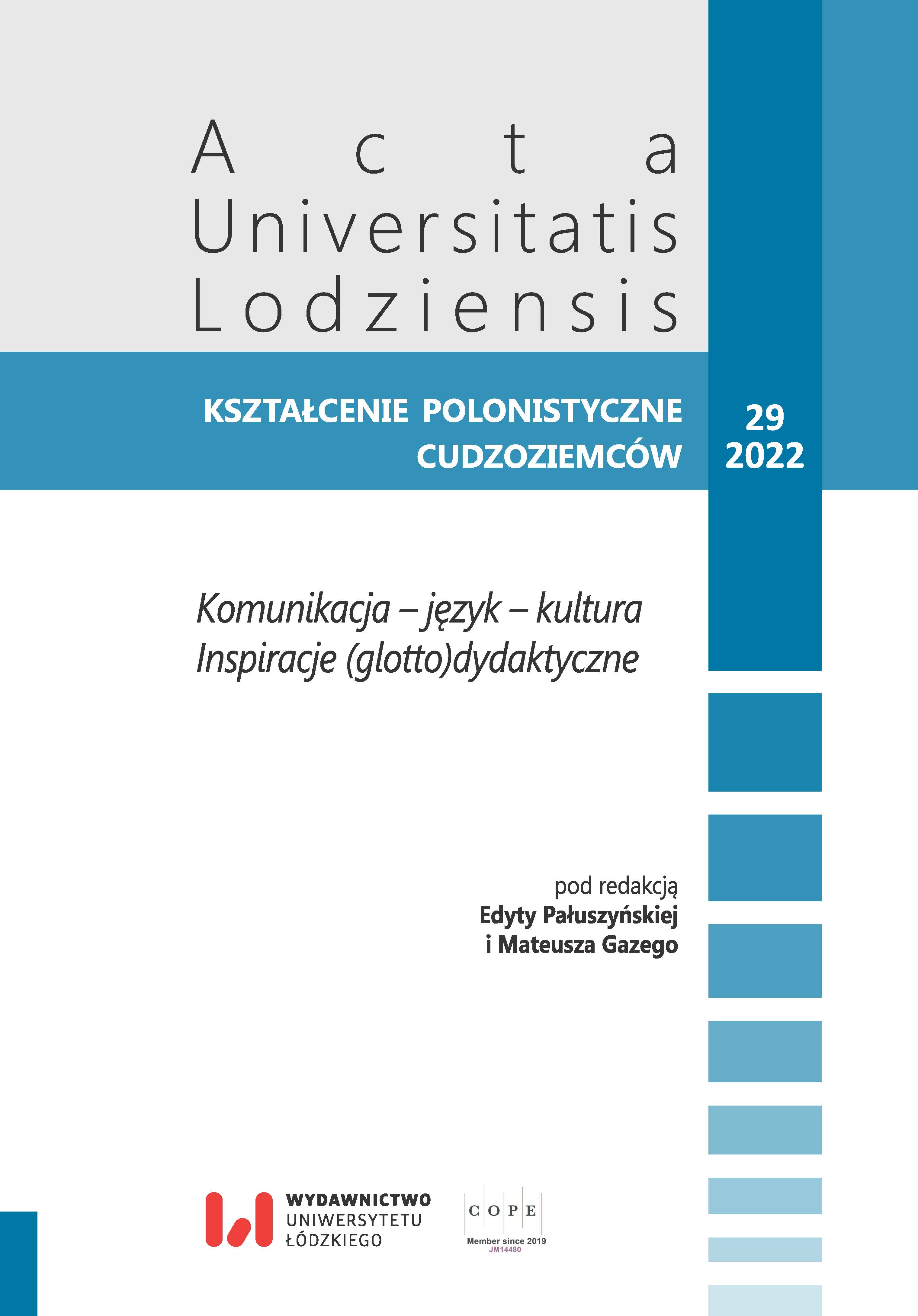The Topic of Ethnic Minorities in Teaching Polish as a Foreign Language – Theoretical Considerations and Survey Research
DOI:
https://doi.org/10.18778/0860-6587.29.22Keywords:
Polish as a foreign language, teaching Polish as a foreign language, teaching Polish culture, ethnic minoritiesAbstract
The aim of the article was to present the issue of ethnic minorities in Poland in the context of teaching Polish language and culture as foreign ones. The text describes the most important aspects related to such communities in Poland and reflects on the title issues during classes for foreigners who learn Polish. The work also contains theoretical findings situating the subject of ethnic minorities in the area of cultural geography. It also includes the results of a study on the knowledge of Polish language learners on the topic and their preferences concerning discussing minority issues during Polish language and Polish culture classes. The group of respondents included 91 participants of Polish language courses at the B2, C1 and C2 levels, and the presented data was obtained with the use of a survey consisting of questions mainly in the form of cafeteria-style checklist. Most of the respondents were able to name two or one ethnic minority, and expressed the willingness to explore the subject matter and include it in the curriculum of Polish language and Polish culture. The largest number of respondents declared their interest in monuments and tourist attractions related to the culture of ethnic minorities in Poland, which is included in the summary of the article and the proposals for practical use of the conclusions drawn from the described study. The theoretical analysis and interpretation of the survey results showed that the subject of ethnic minorities is an element of interest for foreigners learning about Polish society.
References
Ambroch M. i in., 2018, 100 lat Polski w liczbach. 1918–2018, Warszawa.
Google Scholar
Czerkies T., 2014, Polonocentryzm jako niezbywalny element tożsamości (o etnocentryzmie, etnorelatywizmie, akulturacji oraz kulturach centrum i peryferii), w: A. Mielczarek, A. Roter-Bourkane, M. Zduniak-Wiktorowicz (red.), Sukcesy, problemy i wyzwania w nauczaniu języka polskiego jako obcego, Poznań, s. 37–49.
Google Scholar
Dorocki S., 2008, Kultura w aspekcie badań geograficznych, w: Tożsamość kulturoznawstwa, red. A. Pankowicz, J. Rokicki, P. Plichta, Kraków, s. 283–287.
Google Scholar
Dz.U. 2017 poz. 823, Obwieszczenie Marszałka Sejmu Rzeczypospolitej Polskiej z dnia 5 kwietnia 2017 r. w sprawie ogłoszenia jednolitego tekstu ustawy o mniejszościach narodowych i etnicznych oraz o języku regionalnym.
Google Scholar
Dziadzia B., 2014, Naznaczeni popkulturą. Media elektroniczne i przemiany prowincji, Gdańsk.
Google Scholar
Garncarek P., 2013, Jak korzystać z badań nad geografią kulturową w nauczaniu języka polskiego jako obcego, w: J. Mazur, M. Małyska, K. Sobstyl (red.), Glottodydaktyka polonistyczna w obliczu dynamiki zmian językowo--kulturowych i potrzeb społecznych, T. 1, Lublin, s. 139–144.
Google Scholar
Giza A. i in., 2012, Mieszkańcy Polski, w: A. Giza, M. Sikorska (red.), Współczesne społeczeństwo polskie, Warszawa, s. 17–59.
Google Scholar
GUS, 2012, Raport z wyników. Narodowy Spis Powszechny Ludności i Mieszkań 2011, Warszawa.
Google Scholar
GUS, 2021, Harmonogram publikacji wyników NSP, https://stat.gov.pl/spisy-powszechne/nsp-2021/harmonogram-publikacji-wynikow-nsp-2021/ [13.03.2022].
Google Scholar
Janowska I. i in., 2016, Programy nauczania języka polskiego jako obcego. Poziomy A1–C2, Kraków.
Google Scholar
Jasiewicz Z., 2004, Rodzina, społeczność lokalna i grupa etniczna w Polsce i Azji Środkowej: studia i szkice etnologiczne zebrane i wydane z okazji siedemdziesiątej rocznicy urodzin autora, Poznań.
Google Scholar
Kłoskowska A., 2012, Kultury narodowe u korzeni, Warszawa.
Google Scholar
NCK, 2022, Przejrzysty ojczysty, https://www.youtube.com/hashtag/przejrzystyojczysty [04.04.2022].
Google Scholar
Nikitorowicz J., 2009, Edukacja regionalna i międzykulturowa, Warszawa.
Google Scholar
Piwońska Z. (red.), 2001, Edukacja regionalna. Poradnik dla nauczycieli szkoły podstawowej, Rzeszów.
Google Scholar
Po prostu Grzymkowski, 2021, Kurpie – pierwsi snajperzy, którzy znają się na palmach, https://www.youtube.com/watch?v=77csGrsAKoo [04.04.2022].
Google Scholar
Rokita Z., 2020, Kajś. Opowieść o Górnym Śląsku, Wołowiec.
Google Scholar
Seretny A., Lipińska E., 2021, Poziom B2 jako węzłowy etap w osiąganiu biegłości językowej, „Acta Universitatis Lodziensis. Kształcenie Polonistyczne Cudzoziemców”, t. 28, s. 21–46. https://doi.org/10.18778/0860-6587.28.02
Google Scholar
DOI: https://doi.org/10.18778/0860-6587.28.02
Siuciak M., 2010, Język śląski – problem terminologiczny czy społeczny?, „Białostockie Archiwum Językowe”, nr 10, s. 267–277.
Google Scholar
DOI: https://doi.org/10.15290/baj.2010.10.19
Wordwall, b.r.w., Społeczności etniczne w Polsce, https://wordwall.net/pl/resource/471928/geografia/spo%C5%82eczno%C5%9Bci-etniczne-w-polsce [03.04.2022].
Google Scholar
ZPE, b.r.w., Mniejszości narodowe II RP i konflikty na tle narodowościowym, https://zpe.gov.pl/a/mniejszosci-narodowe-ii-rp-i-konflikty-na-tle-narodowosciowym/DRP76tecq [07.03.2022].
Google Scholar
Downloads
Published
How to Cite
Issue
Section
License

This work is licensed under a Creative Commons Attribution-NonCommercial-NoDerivatives 4.0 International License.










